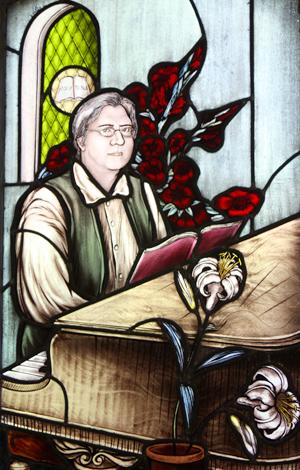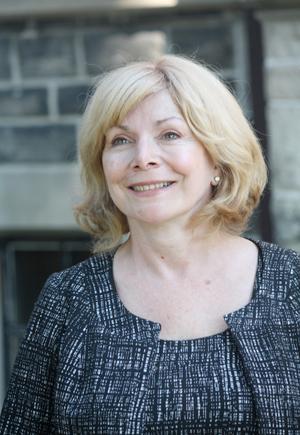
A stained-glass window commemorates Toby Dancer. Credit: Marcus McCann
It’s 1971. A Friday night.
At a dive bar on Queen St — the Cameron House — a group of radicals straggles in after a weekly forum hosted by the Young Socialists down the street, near Queen and Spadina. The conversation from earlier in the evening spills out into the bar. Other patrons, many of them young and lefty themselves, might have joined in. After all, it’s not just the Young Socialists who congregate at the Cameron House, but artists, university students and radicals of all hues.
Among the Trotskyists is a 21-year-old bisexual socialist revolutionary named Cheri DiNovo.
DiNovo, a one-time street busker and high-school dropout, had by then completed an adult high school equivalency and enrolled at York University — which, as now, was regarded as one of the country’s more leftwing schools.
Out of this soup — the Young Socialists, the Cameron House, York University — DiNovo, with Brian Waite, became one of two people to sign what became Canada’s first gay liberation manifesto, We Demand.
DiNovo did not write the document. Its authors — who came from a pool that skewed heavily male — wanted a woman to cosign it, but they had a hell of a time finding someone. People of all genders feared the consequences of a public outing, which could include losing their jobs, eviction and estrangement from their families.
DiNovo, who at the time identified as bi and had a female lover, agreed to sign it.
“I was a reckless 21-year-old. Not to sell myself short, but realistically, it wasn’t bravery, it was recklessness. I mean, I believed in something, so it was like, ‘Damn the torpedoes. Who cares?’” says DiNovo during a ranging and candid 90-minute interview.
The stakes were a little bit different for DiNovo, who was living a more bohemian life than other middle-class university students. She was unlikely to be fired from the kinds of jobs she held at the time — including stints as a hostess at the Colonial Tavern and as a waitress at Swiss Chalet — and even if she did get fired, jobs like those were comparatively easy to find. Unlike many of her peers, she had been financially independent of her parents from a young age.
But, of course, that’s only part of the reason.
“The idea that there are those that we could classify as homosexuals and round up, and there were others that we could classify as heterosexual and give the good jobs to, that is absurd to me,” she says. “That was simply wrong. That’s why I signed the document.”
And so it is that Cheri DiNovo’s name appears on one of the most important documents in this country’s gay liberation struggle, albeit spelled incorrectly (with an “e” where the “i” should be in her last name). And although DiNovo did not make the trek to Ottawa to protest in August 1971, her work continued, with Toronto Gay Action and later The Body Politic.
DiNovo has had a number of careers since then, most memorably as a preacher at Emmanuel Howard Park United Church. In 2006, she underwent another radical life change, this time from minister to politician.
She was elected as a New Democrat member of provincial parliament in a by-election and was returned to office a year later during the 2007 general election. She describes her west-end riding, Parkdale-High Park, as being similar to the neighbourhoods around Queen and Spadina in the 1970s: flourishing, mixed-income and under threat from gentrification.
Queer readers will likely be familiar with DiNovo as the sponsor of a bill to add trans people to Ontario’s Human Rights Code. She named the bill after a trans person from her former congregation whose untimely death galvanized her commitment to trans rights. At the church, Toby Dancer is commemorated in a stained-glass window.
There aren’t a lot of her ideas that sound forced — her tale about Dancer is heartfelt and moving — but the odd moment of partisan grandstanding creeps in. She can perhaps be forgiven, since Ontario heads to the polls in October. And this is an election that’s bound to get ugly.
She cites “the McGuinty cabinet” as the only hurdle to Toby’s bill being passed.
“I’m hoping for a minority government where we can stickhandle it through, or a more favourable government of some stripe that will actually act after Oct 6. I think public sentiment has shifted enough, and it’s time,” she says.
The Liberals are the target of other digressions — including one about the FLQ Crisis of 1970. Of Pierre Trudeau’s decision to declare martial law, she says, “that’s why I’m not a Liberal.”
Meanwhile, she has nary a bad thing to say about the Progressive Conservatives, who, according to DiNovo, “wouldn’t stand in the way” of Toby’s Bill. (At the federal level, Conservatives were vociferously, even virulently, opposed to a similar bill.) She even credits a Conservative triumvirate — former mayor David Crombie, with the backing of provincial and federal Conservatives — for creating the economically diverse St Lawrence Market neighbourhood.
It’s understandable. After all, fear of Tory Leader Tim Hudak could drive NDP swing voters back to the Liberals for a third straight time in October. A strategy that hammers McGuinty’s Liberals while downplaying Hudak’s horribleness could be the NDP’s most important one-two punch this fall.
But for an unrepentant revolutionary, is it hard to swallow?
DiNovo is coy but admits that public life comes with tradeoffs.
“What’s great about it is there is access. For my stakeholders, I can give access to the corridors of power where they didn’t have it before,” she says.
She says it’s difficult, but the weight of the people who depend on her have kept her in check.
And, in her own way, she’s working to change the culture of extreme “partisan warfare everywhere” — her words — at Queen’s Park, in part by introducing a record-setting seven tri-party bills, finding cosponsors for relatively uncontroversial projects among the Liberals and the Tories.
“Quite frankly, that’s the way the place should work,” she says.
Politically, it’s part of a long evolution for DiNovo. That political evolution is perhaps less surprising than her personal one. From drug-involved busker to trustworthy NDP lieutenant — and from self-described bisexual to something different.
“I wouldn’t consider myself queer now. I mean, I’m monogamous, married for 13 years. On what basis would I claim that now?”
“In my own life and in the lives of my friends, I never saw these hard demographics, you know? Homosexual, heterosexual,” she says. “[Even in 1971] I saw that we exist on a queer continuum, that given the right circumstances, you can fall in love with anybody.”
And with that kind of attitude, there may well be more twists along the way. And that, says DiNovo, is perfectly in keeping with her philosophy about the world.
“The ability to be surprising is part of the human creature’s makeup.”


 Why you can trust Xtra
Why you can trust Xtra


